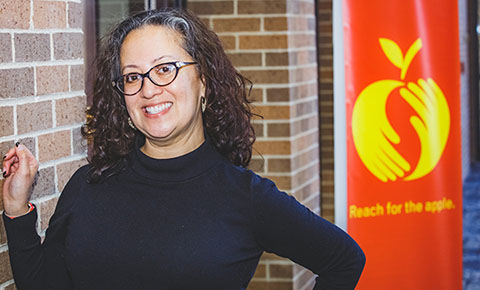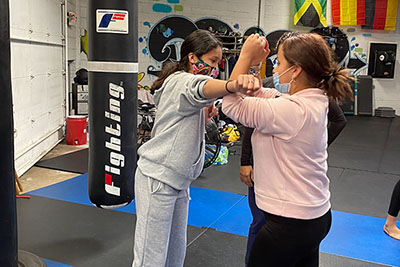She Won a Golden Apple. At Northwestern, Her Teaching Got Even Better.

Middle school teacher Margarita Raya Mojica spent a sabbatical at Northwestern University studying Latina voice, culture, and history. She came away awed, inspired -- and determined to share her experience with her students in East Moline, Ill.
“My sabbatical learning did not end with the Spring Quarter,” said Mojica, who created an interactive Latinx workshop for middle and high schoolers as part of her final class project. “I’m continuing it with families in western Illinois. There is absolutely nothing like this in our area.”
Mojica, a bilingual education teacher, received a coveted 2020 Golden Apple Award for Excellence in Teaching and Leadership for her work with sixth, seventh, and eighth-grade English language learners.
The School of Education and Social Policy’s Master of Science in Education program, a Golden Apple partner for three decades, gives teachers the chance to take Northwestern classes for two quarters. Since the partnership began in 1986, more than 240 Golden Apple teachers have taken classes at Northwestern, with an increasing number sampling the Teacher Leadership program.
The students work with academic advisor Danna Dotson, a former Golden Apple award winner and the field experience coordinator for the Master of Science in Education program. Dotson said she immediately noticed Mojica’s determined focus.
“She went above and beyond to make sure to create something to improve the lives of her students,” Dotson said. “She knew she wanted to take something back.”
The daughter of immigrants from Mexico and a first-generation high school and college graduate, Mojica was lauded for changing her students’ trajectories. In 2013, she co-founded the academic program One By One to help middle school students of color understand how to prepare for college
“My father was a goat herder and my mom washed clothes at a river in Mexico,” Mojica said. “Neither advanced beyond third grade because of extreme poverty. To have studied at Northwestern was an incredible honor.”
The Class She Wished She'd Had
Mojica was drawn to a course offered by both the LatinX Studies and Gender Sexuality Studies programs called Latinx Feminism. Taught by Dr. Alyssa Garcia, college adviser and assistant professor of instruction in the Gender and Sexuality Studies Program in the Weinberg College of Arts and Sciences, the class was something that Mojica said she would have benefited from as a first-generation student navigating the education system on her own.
With Dr. Garcia’s help and support, Mojica developed her own Latinx workshop, modeled on the Northwestern course. She launched the year-long after school program this fall at Glenview Middle School in Moline. All the course materials (videos, Tik Tok, poetry, written materials, speakers) were created by or feature people in the Latinx community.
“Margarita’s project is the epitome of applied Anthropology – of bringing ideas to the community and applying it to everyday life,” Garcia said. “She embraced the scholarship that centered identity and culture as fluid; recognizing agency, resistance and struggle as a complex but empowering process.”
The workshop sessions cover issues relevant to female or non-binary Latinx students, connect the participants to Latinx culture and history, and teach organization and leadership – culminating in a community engagement project. Participants also keep a journal to reflect on what they’re learning and are given self-care tools, such as mediation or yoga.
To underscore the importance of thinking about higher education at a young age, Mojica raised money at the local level to help bring a group of workshop students and students from a first-generation program to Northwestern. A donor, the Gender and Sexuality Studies, and the Latinx Studies Program also contributed funding.
 The students boarded buses at 6 a.m. on a Saturday and made the three-hour trip from East Moline to Northwestern. In Evanston, they toured campus and participated in a panel with faculty and academic advisers. During a lunch session, they asked current first-generation Northwestern students about their experiences and learned more about life as a student of color at a selective university.
The students boarded buses at 6 a.m. on a Saturday and made the three-hour trip from East Moline to Northwestern. In Evanston, they toured campus and participated in a panel with faculty and academic advisers. During a lunch session, they asked current first-generation Northwestern students about their experiences and learned more about life as a student of color at a selective university.
As part of the workshop module “rompiendo silencio” or breaking the silence of sexual harassment, the group also attended a self-defense session in Evanston to discuss bodily autonomy–or the right to make decisions over one’s life and future–and empowerment.
“Our group represented immigrants, children of immigrants, refugees, Black, and Latinx students,” Mojica said. “They all have big dreams for their future. And I want to help them come true.”